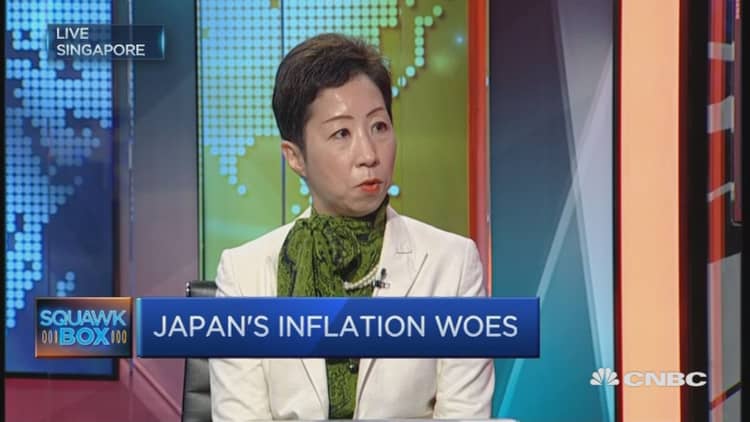
The key to boosting Japan's sluggish economy isn't more monetary policy, it's focusing on making households feel more secure, Sayuri Shirai, a former Bank of Japan board member, told CNBC on Tuesday.
"Just by doing monetary easing, I don't think we can increase the aggregate demand," Shirai, whose five-year term at the BOJ ended on March 31, 2016, told CNBC's "Squawk Box" on Tuesday.
Shirai was also sceptical of the government expanding fiscal policy, another frequently mentioned possibility for boosting Japan's anaemic economic growth.
"If you talk to the households, they all say they are worried about their futures because they don't know how many years they are going to live and then their pensions are not enough," said Shirai, who is currently a professor at Keio University. "So the most important thing is Abe really has to touch on Social Security expansion reform and try to make this pension, health insurance system more sustainable and that is the only way in order to reduce the anxiety and concerns that are prevailing among the households."
Japan's pension and health-care systems have been strained by an aging and declining population, with fewer workers supporting a growing number of retired people. Prime Minister Shinzo Abe's administration has been seeking reforms that would limit pension-benefit payment growth.
In the fourth quarter, Japan's gross domestic product (GDP) grew just 1.0 percent annualized, weighed by sluggish consumer demand.
Household spending in December fell 0.3 percent on-year, while retail sales rose 0.6 percent on-year in December, below expectations from a Reuters poll for a 1.3 percent rise.
Shirai said monetary policy and the resultant weaker yen can't spur more consumption.
"Households are very sensitive to the prices, the general prices and especially food prices," she said. "So this past most recent quarter, you saw the consumption growth was very sluggish. It's because food prices went up. Whenever food prices go up, the consumers feel their disposable income is going down. So they'd rather reduce the consumption."
Shirai said she believed it was time for the central bank to taper its purchases of Japanese government bonds (JGBs). She was one of four dissenters to the BOJ cutting interest rates into negative territory in early 2016; the move was passed on a 5-4 vote. Two of the dissenting voters, Takehiro Sato and Takahide Kiuchi, remain on the nine-member board led by Governor Haruhiko Kuroda and they have also expressed doubts about the policy of massive government bond and financial asset purchases by the BOJ to spur inflation to a sustained 2 percent level.
"As long as BOJ continues to purchase 80 trillion yen [worth], that means they are taking away those JGBs away from commercial banks and institutional investors, which is not sustainable," she said. "It's important the BOJ starts to reduce the amount of BOJ purchases from 80 trillion yen. At the same time, they can raise the 10-year target from the current zero percent level toward the 0.0-0.5 percent range and they make it more market determined interest rate."
In September, the BOJ set a target yield for the benchmark 10-year Japanese government bond at around zero percent. Since then, the BOJ has intervened to keep the benchmark yield in line with its target.
The yield-curve control policy theoretically means the BOJ can buy fewer bonds as it would only need to time its purchases for when the yield curve moves away from its target. That would help ease concerns that the central bank, which already owns more than a third of all JGBs, would run out of bonds to buy as it continued with its planned 80 trillion yen (around $703.53 billion) annual pace of expansion of its monetary base.
The BOJ has taken essentially a "whatever it takes" stance on boosting inflation, saying it would maintain an easy stance until inflation exceeded its target of 2 percent "in a stable manner."
—By CNBC.Com's Leslie Shaffer; Follow her on Twitter @LeslieShaffer1


